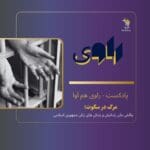
According to reports from the Iran Human Rights Organization and independent sources, since 2010, at least 97 prisoners have died due to denial of medical services in Iranian prisons.
In 2024 alone, more than 18 deaths related to lack of medical treatment were reported.
Fashafouyeh, Raja’i Shahr, and Qarchak prisons have the highest numbers of medically-related deaths.
In this episode, Sahar Naseri and Nazila Golestan, together with guest Hassan Naib Hashem, a physician and human rights activist, address questions about the denial of medical care—not merely a deficiency, but part of an organized policy of repression within prisons—and the security or political objectives this policy serves. They also examine the dire state of healthcare in women’s prisons, including the lack of access to specialist doctors and medications, the role of international aid organizations, and the responsibilities of citizens.
The Hamāva podcast series aims to expand the national discourse around universal values, democracy, the separation of religion and state, human rights, and gender equality.
Within such a framework, through collective wisdom, we can work toward a free and proud Iran for all Iranians, regardless of their beliefs, ideas, gender, or ethnicity.
#WomenLifeFreedom #HumanRights #StopExecutions #Hamāva #PoliticalPrisoner
